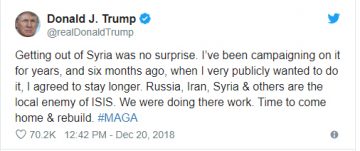
Last Friday President Trump had another long phone call with the Turkish President Erdogan. Thereafter he overruled all his advisers and decided to remove the U.S. boots from Syria and to also end the air war. It was this decision, and that he stuck to it, which finally made him presidential.
Trump’s National Security Adviser John Bolton, his Secretary of Defense ‘mad dog’ Mattis and his Secretary of State Pompeo were all against this decision. The specialist working on Syria, the lunatic special representative for Syria engagement James Jefferey and Brett McGurk, the special presidential envoy for the global coalition to defeat ISIS, were taken by surprise. They had worked diligently to install a permanent U.S. presence in a Kurdish ruled proxy state in northeast Syria.
While these people first tried to change Trump’s decision, their resistance has now ceased:
It is the U.S. supported founding of a Kurdish statelet in northeast Syria which is Ankara’s most serious security concern. The Turkish people support the fight against U.S. supported Kurds and are willing to pay the price for it. The Kurdish YPK leaders are delusional in their demands and overestimate their own political position. The U.S. can not have both, Turkey as an ally and a Kurdish proxy statelet. It has to decide.
Trump never wanted that project to proceed. He had always wanted to declare victory against ISIS and leave. It was the establishment that tried to prevent this and which push the project along.
But there are bigger geopolitical fish to fry than such meddling in the Middle East. Trump knows that the United States’ ‘unilateral moment’ after the demise of the Soviet Union, which left the U.S. was the sole superpower, is over. Russia is back and China is rising. Trump’s policy to adapt to the decreasing U.S. power is to end the ‘globalization’ that allowed for China’s rapid rise. He wants to geopolitical split this world into two influence spheres. These will be separate from each other in the political, economic, technological and military realms.
In this new big game, Syria’s northeast is just a sideshow and not worth a significant involvement. The much larger Turkey, a U.S. NATO ally for 70 years, is way more important. If Trump had not taken the decision to end the neocon Syria project and to remove the U.S. from Syria the U.S. would have lost it:
If the U.S. makes a real offer to Turkey and adopts a new position it might be able to turn Turkey around and to put it back into its NATO fold. If it can not do that the real answer to the question “Who lost Turkey?” will be obvious.






Comments are closed for this post.